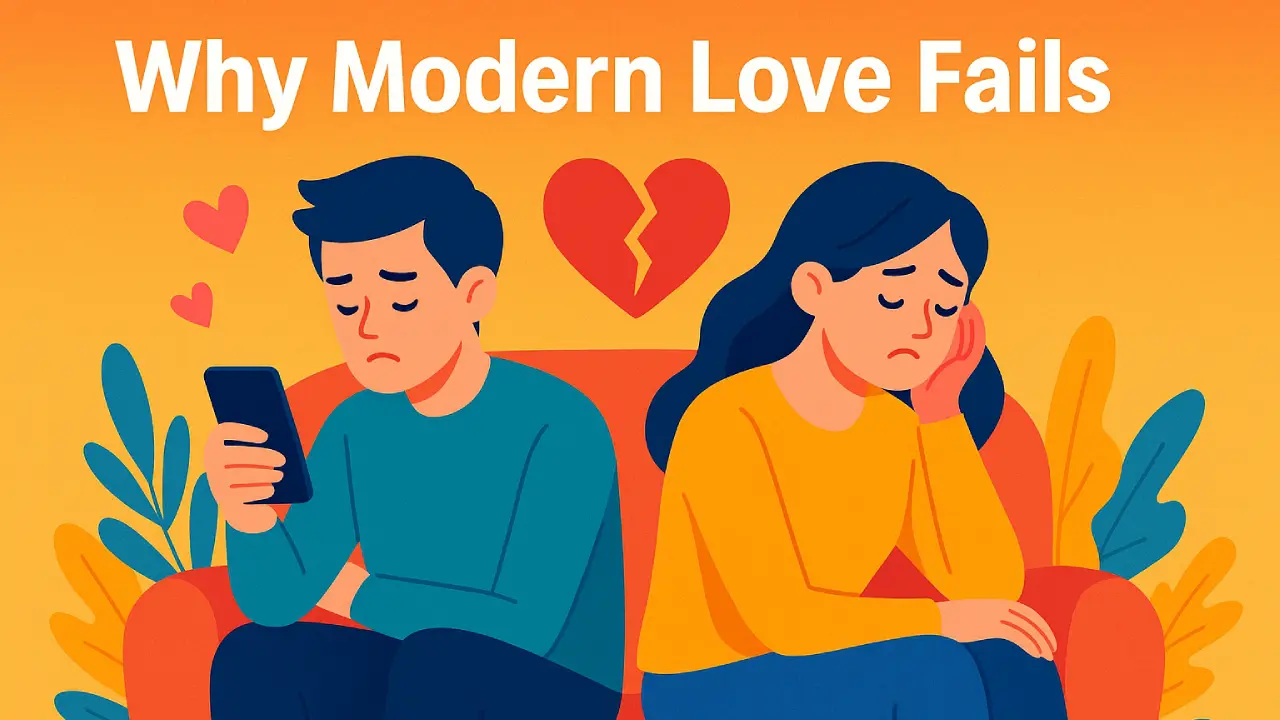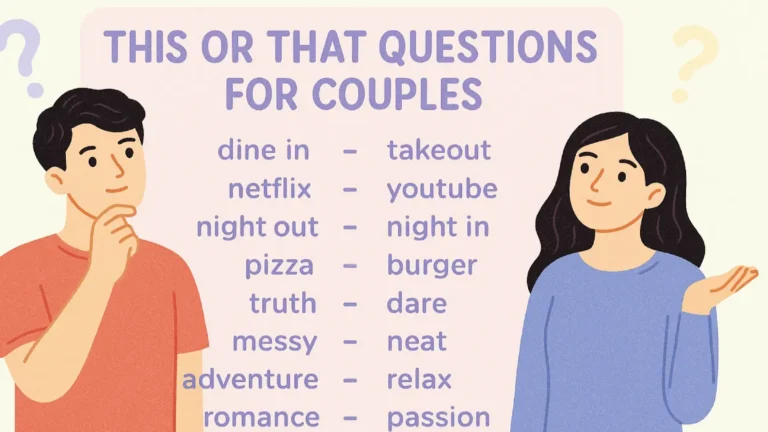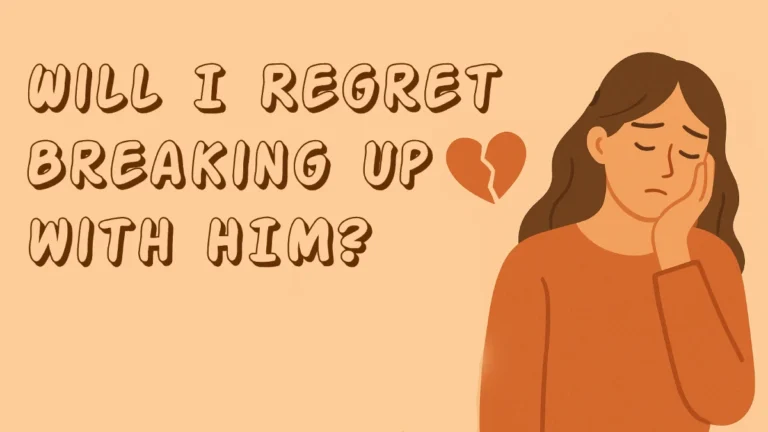Why Modern Love Fails – A Wake-Up Call for Disconnection

Why Modern Love Fails?
Why modern love fails isn’t just about breakups.
Modern love fails because emotional connection has taken a backseat to convenience, distraction, and instant gratification.
People are more plugged into their phones than into each other. Without vulnerability, patience, and presence, love quickly becomes shallow, and eventually, unsustainable.
Love.
We all crave it. We all think we get it.
But truth is, most of us are lost. Playing emotional roulette, hoping for connection in a world that keeps us distracted and disconnected.
Let’s cut the noise and get real about what’s actually going wrong.
Check More Advices on Relationships
The Unspoken Enemy of Love: The Death of “Shared Silence”
We talk endlessly about communication, attraction, trauma, boundaries, but there’s a sacred thread no one talks about anymore. A lost art that once held relationships together without a single word:
Shared silence.
Not the awkward kind.
Not the cold-shoulder kind.
But the rare, soul-soothing kind of silence where two people can just be. No fixing. No scrolling. No noise. Just breath, presence, and the deep, wordless knowing that you’re not alone in this world.
In ancient cultures, lovers and friends often shared long walks, stargazing, hand-holding under moonlight, without a need to fill every second with talk. In that silence, trust grew. Nervous systems synced. Emotional safety was built without effort.
But modern love?
It’s addicted to stimulation. Couples sit next to each other, each lost in their own screen. We’ve confused “constant communication” with connection, and forgotten that real intimacy often lives in quiet presence.
Without shared silence, relationships become mentally loud but emotionally empty.
And no one teaches us how to just sit still with someone we love, without needing to entertain or fix them.
If we want to understand why modern love fails, we must ask:
When was the last time you sat in silence with someone, and felt safe?
The Quiet Collapse of Connection
Modern love isn’t failing because people are evil or incapable. It’s failing because we’re overstimulated, emotionally underdeveloped, and drowning in options with no clue how to connect deeply.
It’s not that we don’t want love. We’re just not trained to build it. We’re trained to chase validation, attention, and momentary high points. And when the chemical buzz fades, we panic. We label it as incompatibility. We blame timing. We ghost. We self-sabotage.
But beneath it all is something simpler: we don’t know how to stay. Not really.
A Personal Confession: I Was Emotionally Illiterate
I didn’t grow up with a manual for how to love. I don’t think many of us did. What I had were assumptions, about masculinity, about power, about needing to be distant to be desired.
In my twenties, I ruined a lot of good things because I didn’t have the language for my emotions. I knew how to charm, how to banter, how to perform affection. But when it came to vulnerability, I shut down.
One day, someone I cared about looked me in the eye and said, “I don’t think you actually know how to love anyone.”
That wrecked me. But it also woke me up.
Emotional Literacy: The Foundation We Never Learned
We were taught to read, to write, to solve equations. But no one taught us to recognize our feelings, name them, sit with them, or share them without shame.
Most fights aren’t about the issue at hand. They’re about unspoken fears, hidden insecurities, unmet needs. But we argue at the surface level because it’s safer.
Love requires depth. And depth requires language.
Imagine being able to say:
- “I’m not angry. I’m scared you’ll leave.”
- “I don’t want space. I want to feel chosen.”
- “I need time, not because I’m losing interest, but because I’m overwhelmed.”
These are not poetic statements. They’re survival tools for intimacy.
The Overstimulation Trap
We live in a world designed to keep us distracted. Scroll. Swipe. Like. Watch. Repeat.
Our attention spans are fragmented, and our nervous systems are constantly activated. That kind of environment is brutal for love.
Why?
Because love grows in silence, in boredom, in slow Saturdays, in presence. And we’ve replaced all that with algorithms and dopamine loops.
So when our partner doesn’t stimulate us every second, when they don’t match the emotional fireworks of a romcom or the intensity of an Instagram reel, we mistake stability for dullness.
But real love is often quiet.
It’s not always exciting, but it’s always there. It doesn’t flood you with novelty. It grounds you in safety.
Emotional Mirroring: The Hidden Superpower
Here’s something most people never learn: being understood is more important than being agreed with.
Emotional mirroring is a practice where, instead of reacting or fixing, you reflect what your partner is feeling.
- They say: “I feel like you don’t see me anymore.”
- You respond: “It sounds like you feel invisible lately. That must be really painful.”
That’s it. No solution. No justification. Just presence.
This single shift in communication can heal years of emotional distance.
We’re not wired to solve each other. We’re wired to feel seen.
Conflict Isn’t the Enemy
Most couples break up not because they fight, but because they fight wrong.
Conflict is inevitable. It’s not a problem. But the way we handle it, that’s everything.
Healthy conflict includes:
- Taking responsibility instead of deflecting
- Listening to understand, not to reply
- Regulating your nervous system before speaking
It’s okay to walk away from a fight, but only if you plan to return with openness.
Unresolved conflict piles up. And over time, it becomes a wall you can’t climb over.
The 90-Second Rule That Changed My Life
I learned something from a therapist that I still use today: when a strong emotion hits, it lasts only 90 seconds unless you feed it with thoughts.
That means most anger, jealousy, or fear will pass naturally if you pause and breathe through it.
But what do we do instead?
We spiral. We assume. We replay. We rehearse our defense.
Try this next time:
- Feel the emotion.
- Name it out loud.
- Breathe deeply.
- Say nothing for 90 seconds.
You’d be shocked how much clarity shows up in that silence.
Rituals Over Romance
We chase grand gestures, but overlook the small patterns that make love last.
Daily rituals are more powerful than declarations.
- A 15-minute walk together
- A question asked every night: “What made you feel loved today?”
- A Sunday coffee date, no phones allowed
These are the roots. The real things. Not the filtered images, not the anniversary dinners.
Consistency is the new chemistry.
Co-Regulation: Loving Through Nervous Systems
Here’s something profound: our bodies talk before our words do.
When someone is anxious, angry, or withdrawn, your nervous system picks up on it instantly.
Co-regulation means learning to calm your body with someone else’s. It’s the difference between:
- “Calm down!”
- And: “I’m here. Let’s breathe. We’re okay.”
Partners who co-regulate create safety. And safety is the soil where intimacy grows.
If love feels unsafe, it dies. Not because you’re incompatible, but because your nervous system never relaxed long enough to feel love.
The Myth of “Right Person, Wrong Time”
We love blaming timing. But often, “wrong time” means “I wasn’t ready to be uncomfortable.”
Love requires discomfort:
- Owning your flaws
- Unlearning toxic behaviors
- Being open when it feels easier to shut down
The “right person” isn’t perfect. They’re just willing to grow with you.
And if you wait for perfect timing, you’ll miss the raw, imperfect love standing right in front of you.
How to Rebuild After Disconnection
You don’t need a new partner. You need a new approach.
Try this reset process:
- State the rupture: “We’ve been distant lately. I miss you.”
- Take ownership: “I realize I haven’t been emotionally available.”
- Invite reconnection: “Can we try again, slowly, with patience?”
Rebuilding doesn’t mean pretending it never broke. It means building something stronger with the pieces.
The Real Definition of Love
Love is not:
- Constant butterflies
- Perfect communication
- Zero conflict
Love is:
- Willingness to show up, again and again
- Choosing each other, especially when it’s hard
- Creating a space where both people can be fully human
It’s not always poetic. But it is always sacred.
A Challenge For You
If you’ve read this far, you care. That already sets you apart.
Here’s a challenge:
Tonight, ask your partner (or yourself, if you’re single):
- What part of me needs the most love right now?
- How can I offer that without expecting anything back?
This is the beginning of emotional intimacy. This is how we heal what modern love forgot.
Let’s not just date better. Let’s love better. Let’s build a culture where connection is sacred, not strategic.
You deserve that.
And if no one ever taught you how to love, maybe this is your start.






